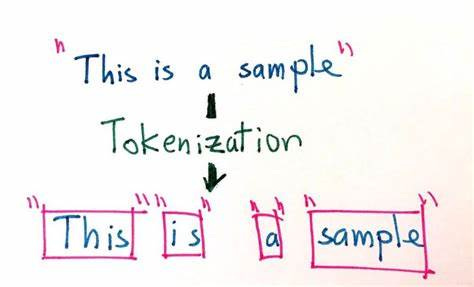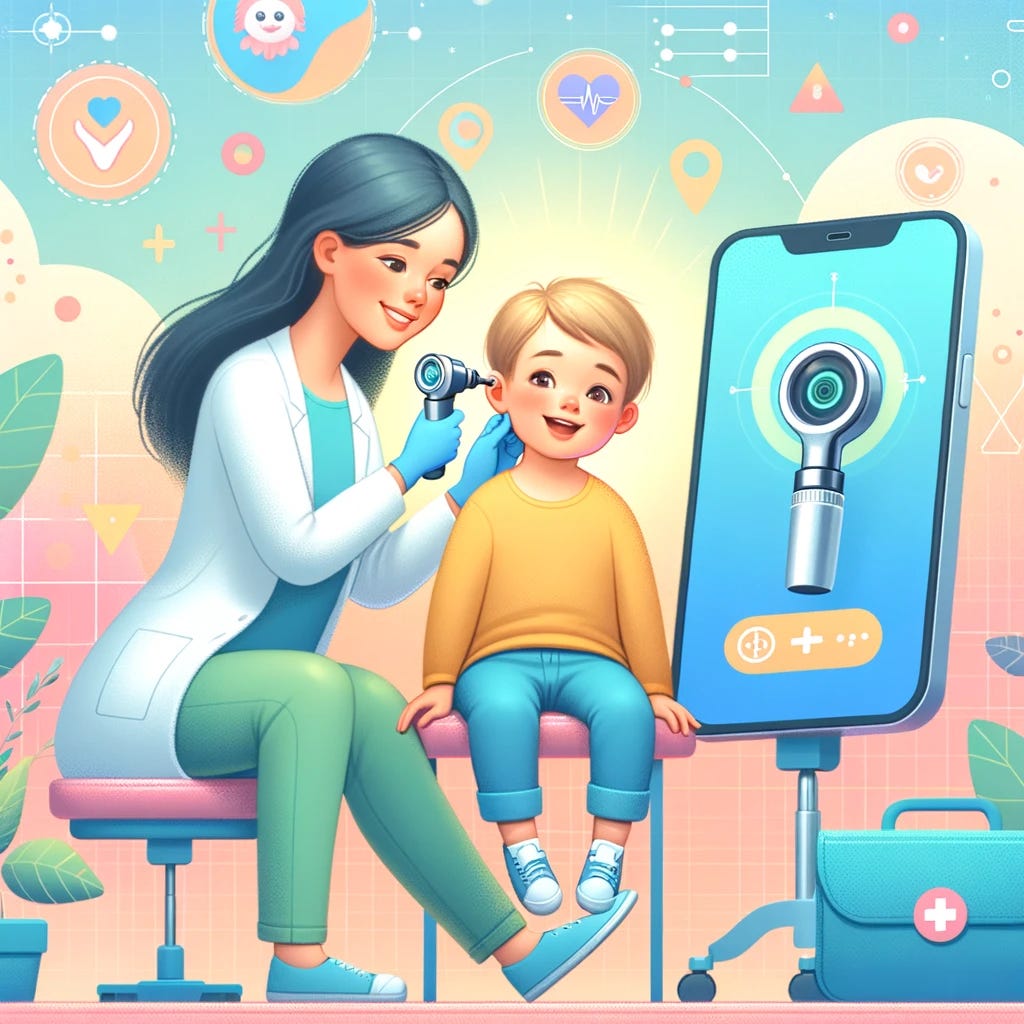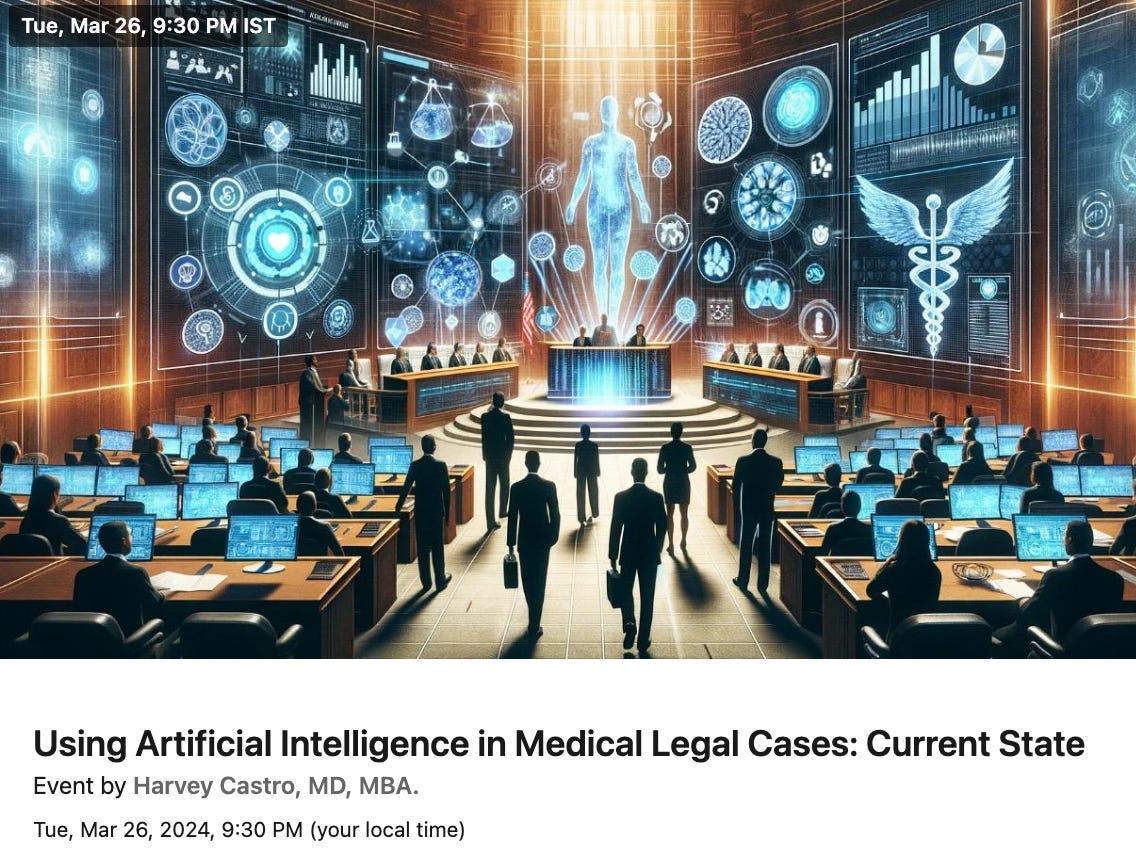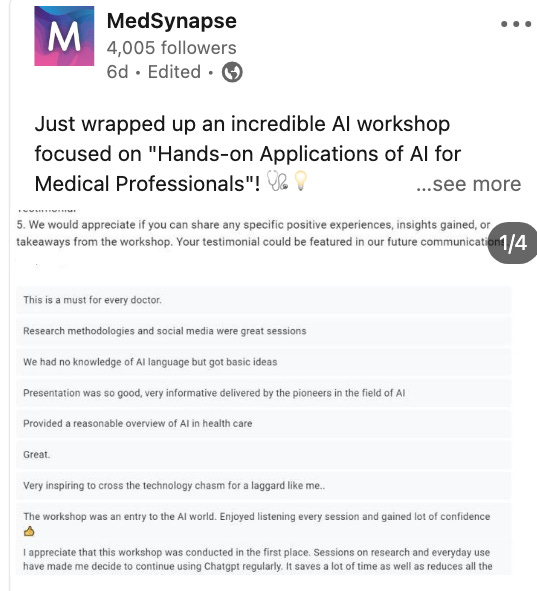👶🔍 AI's Game-Changer: Video Diagnoses for Kids' Ear Infections, and More – Peek Inside to Uncover This Week's Breakthroughs! 🩺💡
Updates on Artificial Intelligence & Emerging Technologies in Medicine 🤖🩺🚀
"Any doctor who loses his or her job because of AI deserves to lose their job" - Nathan Pinskier, GP and ex RACGP e-committee head
Dear Med AI Enthusiast,
Welcome to The ‘Med AI’ Capsule weekly newsletter, your inside look at how artificial intelligence and emerging technologies are transforming medicine.⚕
Whether you're a medical professional 👩⚕️, a technology enthusiast 💻, or simply someone with a curious mind 🧠, The 'Med AI' Capsule is designed for you.
It helps you stay informed 📰 about the latest groundbreaking updates and offers insights into the rapidly evolving world 🌍 of artificial intelligence and emerging technologies in medicine.
Let the adventure begin! I'm thrilled to have you along for the ride. 🚀
In today’s capsule:
5 News Updates (1 Deep Dive)
4 Research Updates (1 Deep Dive)
3 Innovative Companies (Industry Showcase)
2 Upcoming Events
1 Knowledge Resource
Reading Time: 5-7 minutes
News Updates 📰
1. 👶 New AI App Diagnoses Children's Ear Infections with a Video
A new smartphone app using AI to accurately diagnose ear infections in children has been developed by UPMC and the University of Pittsburgh. The app analyzes short videos of the eardrum taken with a smartphone-connected otoscope, offering a more reliable diagnosis than many current methods.
Why Important: This app can help reduce the unnecessary use of antibiotics in young children by ensuring accurate diagnoses.
“These findings suggest that our tool is more accurate than many clinicians. It could be a gamechanger in primary health care settings to support clinicians in stringently diagnosing AOM and guiding treatment decisions.” - Alejandro Hoberman, M.D.
Caution: Despite its high accuracy, the effectiveness of this AI tool in real-world applications should be continuously monitored to ensure it complements the expertise of healthcare professionals without leading to overreliance on technology.
2. 🚀 AI Breakthrough Speeds Up Kidney Failure Predictions
Sheffield Teaching Hospitals' AI tool revolutionizes kidney failure diagnosis in polycystic kidney disease by boosting prediction speed sixfold, promising timely interventions while underscoring the importance of integrating AI with healthcare professionals' irreplaceable insights for optimal patient outcomes.
3. 👁️ AI and 3D Printing Revolutionize Prosthetic Eye Production, Enhancing Accessibility and Comfort
An innovative use of AI and 3D printing by researchers significantly cuts down the time needed to create prosthetic eyes, streamlining the process to benefit more individuals, yet the expertise of human ocularists remains essential for final adjustments, ensuring both fit and aesthetics are optimized.
4. 🩸 NHS Embraces VR for Futuristic Blood Transfusion Training
The NHS's innovative virtual reality app 'NHSBT Blood Identification' elevates blood transfusion training to new heights, broadening educational opportunities and addressing recruitment gaps in transfusion science, yet it highlights the importance of supplementing virtual learning with real-world experience to ensure comprehensive skill development.
5. 🦿 Innovative TWIN Exoskeleton Enhances Mobility with Ease and Portability
Italian researchers have unveiled the TWIN exoskeleton, designed for lower-limb mobility with user-friendly features and transportability, aiming for market release following European certification to aid in rehabilitation and improve life quality, however, personalized adjustments and professional guidance remain essential for ensuring safe and effective use.
Research Updates 🔬
1. 🤖 AI Algorithm Faces Real-World Chest X-Ray Analysis Test in Primary Care
The paper externally validates an AI algorithm designed for interpreting chest X-rays against radiologist diagnoses, demonstrating high accuracy and specificity but lower sensitivity for certain conditions, particularly those involving the mediastinum, vessels, and bone.

Key Insights and Lessons Learned:
External validation of AI algorithms for medical image analysis is crucial for their implementation in clinical practice.
The AI algorithm showed high accuracy and specificity in identifying images with or without conditions, making it potentially valuable for primary care settings.
Sensitivity varied across different anatomical areas, with lower performance observed in conditions involving the mediastinum, vessels, and bone.
Identification of areas where the algorithm lacks sensitivity provides insights for further refinement and improvement.
Suggestions for Future Research:
Investigate techniques to improve the sensitivity of AI algorithms for detecting abnormalities in anatomical areas where performance is currently lower.
Explore the potential benefits of integrating AI algorithms into diagnostic workflows in specialized medical settings beyond primary care.
Investigate the generalizability of the validated AI algorithm across diverse patient populations and healthcare settings.
Explore the ethical and legal implications of implementing AI algorithms in clinical practice, including issues related to liability, privacy, and patient consent.
2. 🔍 AI-Based Tool Sharpens Fight Against HIV and STIs
The MySTIRisk AI tool, with its precise risk score thresholds, significantly enhances the identification of individuals at high risk for HIV and STIs, however, integrating such tools into clinical practice demands careful consideration of their limitations and ensuring they complement traditional clinical judgment.
3. 🚀 Innovative AI Model Forecasts Post-Surgery Ileus in Cancer Patients
Utilizing XGBoost and Decision Tree algorithms, researchers unveil an AI tool capable of predicting post-operative ileus in laparoscopic colorectal cancer surgery, heralding a step towards customized patient care, albeit highlighting the need for further model enhancements and real-world validations.
4. 🔍 AI Model Predicts Osteoporosis Risk from Chronic Disease Data
A newly developed machine learning model shows promise in predicting osteoporosis risk using chronic disease data, highlighting the potential for early detection and tailored management strategies, yet emphasizing the need for integrating a broader range of risk factors and addressing data privacy concerns in clinical implementation.
Industry Showcase 👨🏭
Deepscribe - transforming healthcare by leveraging AI to automate medical documentation, allowing clinicians to focus more on patient care. Their AI systems analyze conversations between doctors and patients to generate medical notes, integrating seamlessly with EHRs. This innovation aims to reduce clinician burnout and administrative burdens, promising to enhance the efficiency and quality of patient care.
InteractAI - focuses on transforming medical education through virtual reality. Their platform offers immersive VR training, providing medical students with cost-effective, diverse training scenarios and individualized, data-driven feedback. This innovative approach aims to improve the hands-on practice of clinical consultation, making medical education more engaging and efficient.
HealthBlocks - innovating at the crossroads of blockchain and healthcare, offering a web3 health app that rewards healthy lifestyles. It allows users to access health services, share their data in a privacy-preserving manner, and profit from it. The platform stands out by empowering users to control their health data, traditionally managed by centralized entities, using decentralized technologies.
Upcoming Events 🧑💻
Knowledge Resource 📚
Blog Article: Career Guide In Digital Health And Healthcare AI by Andrea Koncz (TMF)
This article provides career guidance for individuals interested in entering the fields of digital health and healthcare AI.
It highlights the convergence of technology and healthcare, advocating for a multidisciplinary approach and the value of having expertise in multiple domains.
Specific advice is tailored for researchers, medical professionals, technologists, traditional med-tech professionals, and biomedical engineers, emphasizing the importance of understanding both technological and clinical needs to drive innovations that are both impactful and patient-centered.
The article underscores the role of curiosity and passion in navigating a career in these evolving fields.
Let’s wrap it up with an AI concept made easy! 👨🏫
'Tokens' in AI Language Models 🤖
Tokens in AI, similar to Lego pieces, are fundamental elements used for constructing sentences and understanding language. 🧩
Each token, which can be a word, part of a word, or punctuation, is identified and processed by AI to grasp and generate human language effectively, making language processing akin to building structures with Lego - where each piece is crucial for the overall design. 🎨

This method simplifies complex language for AI, much like how it's easier to eat a pizza slice by slice. 🍕
Your feedback is crucial to me, as it helps me understand your interests and improve my offerings. I would appreciate it if you could take a few minutes to share your thoughts about what you've enjoyed and what you think I could do better - https://forms.gle/xpbpgVEyARWx6ZxN8
Stay tuned for our upcoming editions as we explore the latest breakthroughs and dive deep into the transformative power of artificial intelligence and emerging technologies, shaping a healthier future. 🚀
Warm regards,







